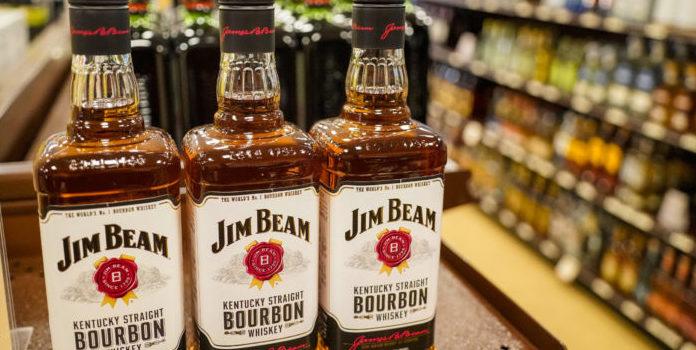(Headline USA) Jim Beam plans to ramp up bourbon production at its largest Kentucky distillery to meet growing global demand in a more than $400 million expansion to be powered by renewable energy.
The project will increase capacity by 50% at the Beam plant in Boston, Kentucky, while reducing greenhouse gas emissions by the same percentage, Beam Suntory said Wednesday.
The company behind the top-selling bourbon said it has reached production capacity at the Boston plant, about 36 miles south of Louisville, Kentucky. The expansion will be used to produce two mainstays—Jim Beam white- and black-label bourbons—and will mostly support expected sales growth overseas, especially in European and Asian markets, said Carlo Coppola, managing director of the Beam brands.
Jim Beam has registered mid-single-digit growth globally in the past two years, the company said.
Mixing renewable energy into crafting whiskey, Beam will use a process that produces renewable natural gas to power the plant, the company said.
Beam Suntory said it has entered into an agreement with 3 Rivers Energy Partners to build a facility across the street to convert waste from making bourbon into biogas, which will be treated to renewable natural gas standards and piped directly back to the distillery.
Once the project is completed, expected to be in 2024, the distillery will be 65% powered by renewable natural gas and 35% by fossil-based natural gas, the company said.
“This expansion will help ensure we meet future demand for our iconic bourbon in a sustainable way that supports the environment and the local community that has helped build and support Jim Beam,” said Beam Suntory President and CEO Albert Baladi.
Beam Suntory, whose products include Kentucky-crafted Maker’s Mark, said last year it wants to cut its companywide greenhouse gas emissions and water usage in half by 2030.
The company’s more ambitious goal is to remove more carbon than is emitted from its operations and among its supplier base by 2040.
The virtue-signaling spirits giant also is committed to planting 500,000 trees annually by 2030, with a goal of planting more trees than are use to make barrels to hold its aging whiskeys.
The new project will create 51 more jobs and includes additional storage warehouses.
Bourbon ages in new, charred oak barrels, where it acquires its color and flavor, while stored in warehouses. Most bourbons typically age four to eight years before reaching consumers.
Beam’s continued growth “reflects the strength of our state’s signature bourbon industry,” Kentucky Gov. Andy Beshear said.
Beam also is “fully leveraging” its capacity at its distillery in Clermont, Kentucky, where it produces Jim Beam, Basil Hayden, Knob Creek and Legent brands.
The two Beam distilleries are about 14 miles apart in central Kentucky. At another distillery that opened last year at Clermont, the company produces such small-batch brands as Booker’s, Baker’s and Little Book.
The company broadly outlined its Boston plant expansion earlier in the summer, but the announcement Wednesday provided details about production and the use of renewable energy.
Beam Suntory, a subsidiary of Suntory Holdings Limited of Japan, isn’t the first maker of bourbon to go green. Last year, spirits giant Diageo opened a carbon-neutral distillery of Bulleit bourbon powered by renewable energy in Lebanon, Kentucky.
Beam’s expansion at its Boston distillery comes amid continued rapid growth in the state’s $9 billion distilling industry.
Kentucky distillers are in the midst of a more than $5 billion capital investment campaign that includes expanding production facilities and warehousing to meet the global thirst for Kentucky bourbon, according to the Kentucky Distillers’ Association.
Kentucky is home to 95% of the world’s bourbon production, the association said.
Adapted from reporting by the Associated Press

